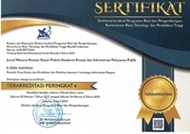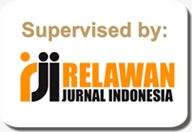E-Gov Implementation Analysis Through SILPa KAMI Application in DISKOMINFOARPUS, Cimahi City
Abstract
The development of information and communication technology (ICT) has been implemented in various fields, including in government. To support the implementation of e-Government (e-Gov) and improve the quality of public services, many technology-based applications have been created by government agencies, both central and local governments. DISKOMINFOARPUS Cimahi City built an application called SILPa KAMI to support the vision of Cimahi Smart City. This study uses a qualitative descriptive method that aims to determine how the implementation and sustainability of the SILPa KAMI application and what kind of characteristics the agencies should have so it can replicate this application. The results of the study reveal that the implementation of the SILPa KAMI application is running well because it has fulfilled various success factors of e-Gov implementation which is also marked by the sustainability even though there are still obstacles. Also, the use of ICT based on the e-leadership aspect, the information network infrastructure aspect, the information management aspect, the business environment aspect, as well as the community and human resources aspect has been optimally utilized. This application is relatively easy to be replicated by other agencies. The agencies that can replicate this application must have the availability of budget, the availability of related facilities and infrastructure and the availability of reliable ICT managers.
Keywords
Full Text:
PDFReferences
--. (2003). Instruksi Presiden RI Nomor 3 Tahun 2003 tentang Kebijakan dan Strategi Nasional Pengembangan E-Government.
--. (2018). Peraturan Presiden Republik Indonesia Nomor 95 Tahun 2018 tentang Sistem Pemerintahan Berbasis Elektronik (p. 110).
Abdulrahman, L. Q., & Abdulrahman, H. A. (2015). e-Government: Advantage of e-Gov, Case Studies and Reasons of Not Apply of e-Gov in Kurdistan-Iraq. General Sciences Journal Erbil Polytechnic University, 5(3), 1–10.
Albuquerque, D. J., Nunes, V. anessa T., Ralha, C. G., & Capelli, C. (2017). E-gov Transparency Implementation Using Multi-agent System: a Brazilian Study-Case in Lawsuit Distribution Process. Proceedings of 50th Hawaii International Conference on System Sciences, 2772–2781.
Alwasilah, C. (2008). Pokoknya Kualitatif. Dunia Pustaka Jaya.
BAKÓ, R. K. (n.d.). IN. GOV WE TRUST: ASSESSING E-GOVERNANCE PERFORMANCE IN ROMANIA. In researchgate.net. https://www.researchgate.net/profile/Karen_Mogendorff/publication/309566942_Pity_fear_and_’admiration’_for_disabled_people_The_role_and_function_of_emotions_in_encounters_between_disabled_people_and_non-disabled_people/links/58a6ff10a6fdcc0e078ae3dc/Pity-
Chaidir, R. R., Fauzi, R., & Mulyana, R. (2020). Perancangan Manajemen Risiko Operasional SPBE/e-Gov pada Kategori Sumber Daya Manusia, Keamanan Dan Bencana Alam Berdasarkan PermenPAN&RB No. 5 Tahun 2020: Studi Kasus di Pemerintah Kota Bandung. EProceedings of Engineering, 7 (2).
Dewi, M. A., Ambarwati, A., & ... (2018). ANALISIS RISIKO KUANTITATIF ASET TI PADA BLC E-GOV DINKOMINFO SURABAYA. Prosiding SEMNAS …. https://proceeding.unpkediri.ac.id/index.php/inotek/article/view/448
Feoh, G., Linawati, & Wirastuti, N. M. A. E. D. (2015). Indeks Kepuasan Pengguna Situs Web E-Gov Di Bali Dengan Metode EUCS Dan CSI. Konferensi Nasional Sistem & Informatika 2015, 367–372.
Goulas, D., Valkanos, E., & Droulia, K. (2016). How E-Gov in Greece Affects Life-Long Learning for Public Servants, Working on Technical Field. Universal Journal of Educational Research. https://eric.ed.gov/?id=EJ1110789
Hamed, M., Mobarez, O. M., & Ibrahim, M. . G. (2018). The Role of the Electronic Government (E-Gov.) in Improving the Perceived Quality of the Electronic Services in the Local Units. IOSR Journal of Economics and Finance (IOSR-JEF), 9(6 Ver. III), 83–87.
Hassan, M. (2015). Policymakers’ perspective towards e-Gov success: A potent technology for attaining Good Governance in Pakistan. In 2015 5th International Conference on Digital Information Processing and Communications, ICDIPC 2015 (pp. 272–281). https://doi.org/10.1109/ICDIPC.2015.7323041
Humas, K. P. A. N. dan R. B. (2020). Hasil Survei PBB, e-Government Indonesia Naik Peringkat. Menpan.Go.Id. https://menpan.go.id/site/berita-terkini/hasil-survei-pbb-e-government-indonesia-naik-peringkat
Mulyani, S., Retnowati, Listiyono, H., & Susanto, S. A. (2018). Menakar Keberhasilan e-Gov dalam Perspektif e-Participation dengan Indikator METEP. Prosiding SINTAK 2018, 172–181.
Nainggolan, A. C. (2020). E-Government bagi Efisiensi Pelayanan Publik di Indonesia. RMOL BANTEN. https://www.rmolbanten.com/read/2020/12/24/20839/E-Government-Bagi-Efisiensi-Pelayanan-Publik-Di-Indonesia-
Ouchetto, H., Hassoumi, I., & Ouchetto, O. (2015). Leading change in e-gov projects. International Journal of Applied Sciences and Innovation, 2, 38–46.
Purwadi, S. (2016). Analisis Pemanfatan Aplikasi e-Gov untuk meningkatkan Pelayanan Publik (Studi Kasus Kota XYZ). Politeknik TEDC Bandung, 10, 11–19.
Putri, T. D. (2015). Penerapan Electronic Goverment (e-Gov) Melalui Penyelenggaraan Situs Web Pemerintah Provinsi Riau Untuk Mewujudkan Transparansi Publik. Jom FISIP, 2(2).
Rakhmat, J. (2002). Metode Penelitian Komunikasi. Remaja Rosdakarya.
Rosady, R. (2010). Metode Penelitian Public Relations dan Komunikasi. Rajawali Press.
Sabani, A. (2020). Investigating the Influence of Transparency on the Adoption of e-Government in Indonesia. Journal of Science and Technology Policy Management, 2053–4620. https://doi.org/10.1108/JSTPM-03-2020-0046
Setiyorini, A., Kusrini, & Al-Fatta, H. (2018). Evaluasi Website dengan e-GovQual. Jurnal Informasi Interaktif, 3(2), 121–128. e-journal.janabadra.ac.id
Sugiyono. (2005). Memahami Penelitian Kualitatif. CV. Alfabeta.
Sumaryono, A. (2019). Laporan Seminar Laboratorium Kepemimpinan: Optimalisasi Layanan Persandian dan Keamanan Informasi dalam Mendukung Efektivitas Pelayanan Publik.
Supriyanto, A., & Mustofa, K. (2016). E-gov Readiness Assessment to Determine E-Government Maturity Phase. 2nd International Conference on Science in Information Technology (ICSITech), 270–275.
DOI: http://dx.doi.org/10.31845/jwk.v24i2.696
Refbacks
- There are currently no refbacks.
Copyright (c) 2021 Yunni Susanty

This work is licensed under a Creative Commons Attribution-NonCommercial-ShareAlike 4.0 International License.
JURNAL WACANA KINERJA INDEXED BY:
__________________________________________________________________________________________________________
@2023 Center fo State Civil Apparatus Training and Development and Competency Mapping (Pusat Pelatihan dan Pengembangan dan Pemetaan Kompetensi Aparatur Sipil Negara Lembaga Administrasi Negara - Puslatbang PKASN LAN) Jl. Kiara Payung KM. 4, 7 Jatinangor, Sumedang, Jawa Barat 45366 Telp. (022) 7790048-7790044-7790049-7782041-7782042 Fax. (022) 7790055-7782178; Email: wacanakinerja@yahoo.com; wacanakinerja@gmail.com
Powered by OJS
















